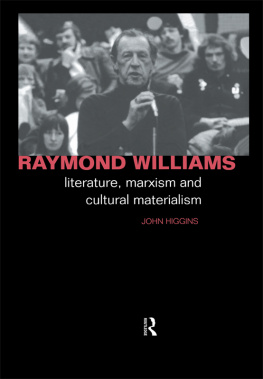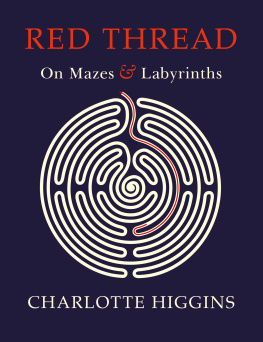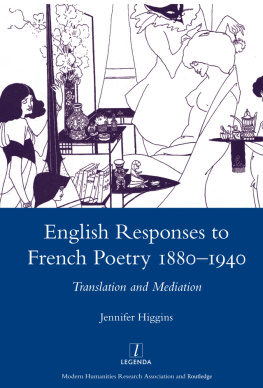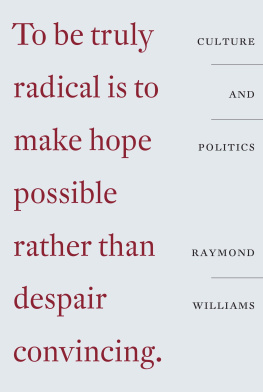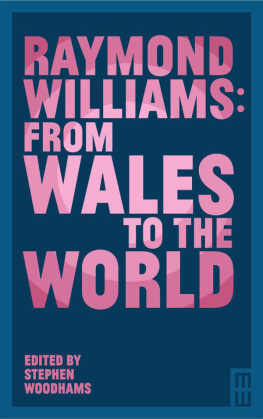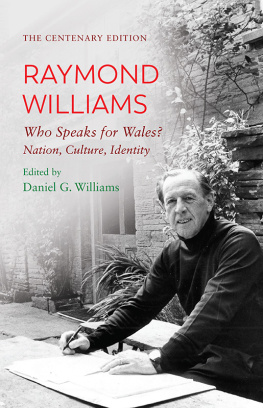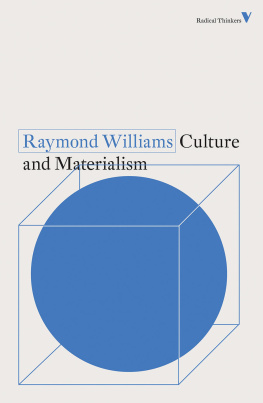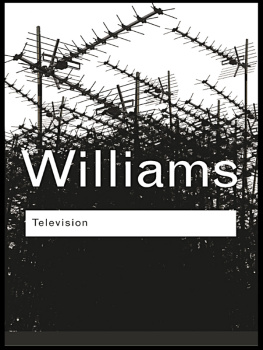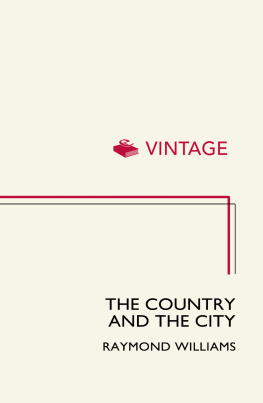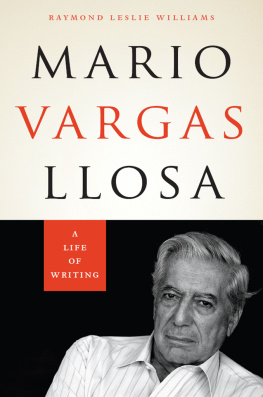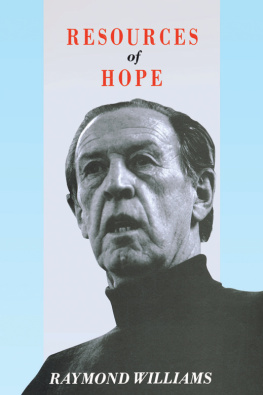Raymond Williams
Daring, controversial and brimming with intellectual rigour and integrity, Raymond Williams's work is increasingly regarded as one of the milestones in twentieth-century criticism. Williams successfully challenged the reigning academic orthodoxy in such seminal works as Culture and Society, Drama from Ibsen to Brecht, The Country and the City and Marxism and Literature.
Raymond Williams: Literature, Marxism and Cultural Materialism offers the single most comprehensive historical and theoretical account of Williams's work to date. John Higgins examines what Williams termed his prolonged argument with official English culture, focusing in particular on the complex and ambivalent relation of his thinking to its two main sources: Marxist cultural theory and Cambridge English studies. Higgins provides a detailed account of the different contexts and occasions of Williams's arguments and interventions, tracing the dynamic development of his work from its beginnings in the 1940s' debates on Marxism and culture, through the cultural politics of the New Left and the later critique of structuralism, to its culmination in the theory and practice of cultural materialism. This book vigorously challenges many of the received ideas and images of the value and substance of Williams's work, throwing new light on his crucial relation to figures such as T.S. Eliot, Christopher Caudwell and Mikhail Bakhtin, and offers a powerful argument for the continued relevance of Williams's thought to contemporary debates.
John Higgins is Senior Lecturer in the Department of English at the University of Cape Town, and a Convenor of the Theory of Literature Programme. He is the founding editor of the South Mrican journal, Pretexts: Studies in Writing and Culture, and the author of numerous articles on film, literature and cultural politics.
Critics of the Twentieth Century
General editor: Christopher Norris
University of Wales, Cardiff
Northrop Frye
The theoretical imagination
Jonathan Hart
A.J. Gerimas and the nature of meaning
Ronald Schleifer
Christopher Caudwell
Robert Sullivan
Figuring Lacan
Criticism and the cultural unconscious
Juliet Fower MacCannell
Harold Bloom
Towards historical rhetorics
Peter de Bolla
Julia Kristeva
John Lechte
Geoffrey Hartman
Criticism as answerable style
G. Douglas Atkins
Ezra Pound as Literary Critic
K.K. Ruthven
Kenneth Burke
Rhetoric and ideology
Stephen Bygrave
Antonio Gramsci
Beyond Marxism and postmodernism
Renate Holub
Postmodern Brecht
Are-presentation
Elizabeth Wright
Deleuze and Guattari
Ronald Bogue
The Ecstasies of Roland Barthes
Mary Bittener Wiseman
Jrgen Habermas
Critic in the public sphere
Robert C. Holub
William Empson
Prophet against sacrifice
Paul H. Fry
Paul Ricoeuer
S.H. Clark
Introducing Lyotard
Art and politics
Bill Readings
F.R. Leavis
Michael Bell
Roman Jakobson
Life, language, art
Richard Bradford
Jacques Derrida
Opening lines
Marian Hobson
Raymond Williams
Literature, Marxism and cultural materialism
John Higgins
First published 1999
by Routledge
2 Park Square, Milton Park, Abingdon, Oxon, OX14 4RN
Transferred to Digital Printing 2005
Simultaneously published in the USA and Canada
by Routledge
270 Madison Ave, New York NY 10016
1999 John Higgins
Typeset in Baskerville by Routledge
All rights reserved. No part of this book may be reprinted or reproduced or utilised in any form or by any electronic, mechanical, or other means, now known or hereafter invented, including photocopying and recording, or in any information storage or retrieval system, without permission in writing from the publishers.
British Library Cataloguing in Publication Data
A catalogue record for this book is available from the British Library
Library of Congress Cataloguing in Publication Data
Higgins, John. Raymond Williams: literature, Marxism, and cultural
materialism. Includes bibliographical references and index.
1. Williams, Raymond Knowledge and learning.
2. Literature History and criticism Theory, etc.
3. Criticism England History 20th century.
4. Marxist criticism England. 5. Culture
Historiography. 6. Historical materialism. I. Title. II. Series: Critics
of the twentieth century (London, England).
PR6073.14329768 1999
9831008
828.91409dc21
CIP
ISBN 0415023440 (hbk)
ISBN 0415023459 (pbk)
In memory of Margaret Higgins 19211981
Contents
Acknowledgements
he is trying to write down a book he wrote years ago in his head
South America
Tom Raworth's line, from his fine poem south America, always seemed to capture something of my predicament with this project. It would never have made it on to the page without the encouragement of friends and family too numerous to mention, but they all know who they are, and what their kind support has meant to me over the years, whether in Great Britain, Switzerland or South Africa.
More formally, though the substance of the debt goes beyond formality, I take the opportunity to thank those who provided some of the concrete occasions for writing or speaking on Williams's work. Many thanks are due to both Bruce Rob bins and Jonathan Arac for their early encouragement to write on Williams for boundary 2, and similarly to Michael Sprinker (the Minnesota review); thanks also to Susan van Zyl (Journal of Literary Studies) and Christopher Prendergast (Social Text Collective) for later opportunities.
I am also grateful to Peter de Bolla (formerly University of Geneva), Peter Kohler (University of the Western Cape), Reingard Nethersole (University of the Witwatersrand), Maud Ellmann (King's College, Cambridge), Stewart Crehan (University of the Transkei), and Fredric Jameson (Duke University) for invitations to speak on Williams at their respective institutions. All of these occasions contributed in some way to the formulations presented here.
More specifically, thanks are due to Tina Barsby, Louise Green and David Schalkwyk, who each read parts of the manuscript and gave their always welcome and insightful advice. Christopher Prendergast read an early draft of the book as a whole, and his critical comments were acute and stimulating. A number of informal conversations with Terry Eagleton, Edward Said and Gareth Stedman Jones were also very useful to me, as was the general encouragement of both Tony Tanner and Gayatri Spivak. My most pervasive debt is to Frances Long-Innes, for more than a decade of ever-stimulating and critical dialogue.
I benefited enormously in the final stages of writing and revision from my sustaining dialogue with Jessica Dubow; and the very careful readings of the book made by John Coetzee, Anthony Morphet and John Kench: to respond adequately to their probing critical concerns as to those of Routiedge's readers (Christopher Norris, who also first suggested the idea for the book, Graham Martin, and Terry Eagleton) would have made it necessary to write a different and better study than this. I should also record that the late Raymond Williams was kind enough to offer help and encouragement at an early stage in the planning of this work.

